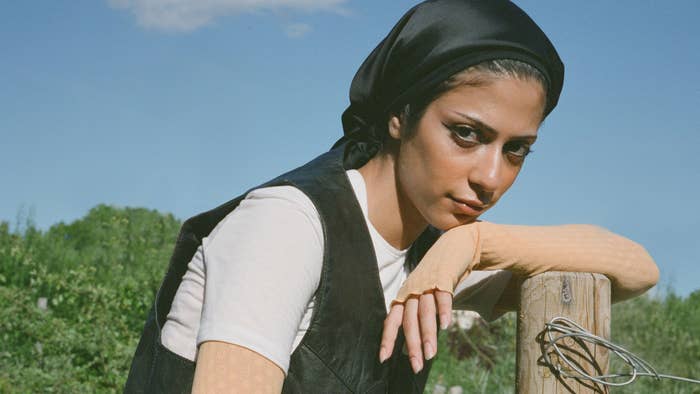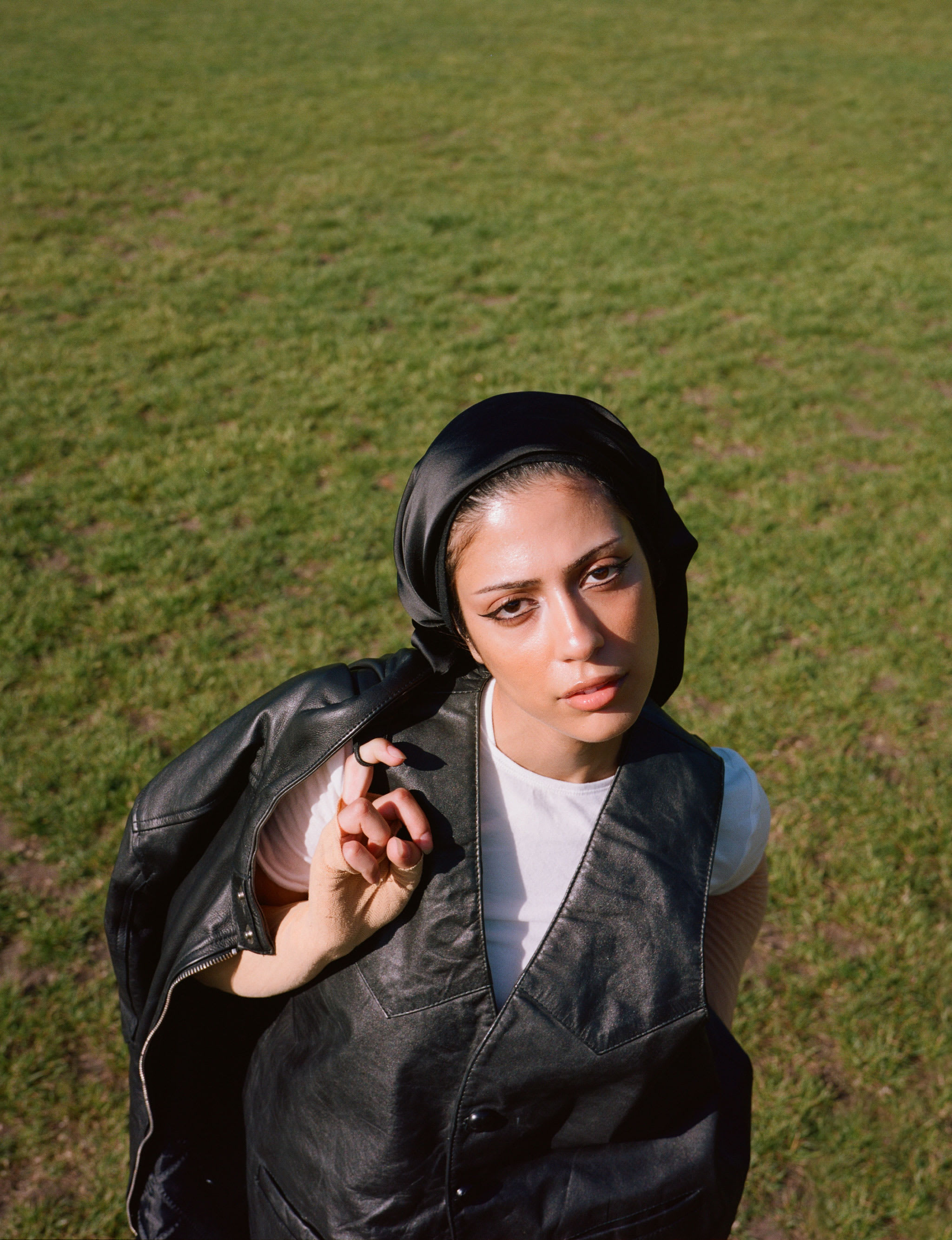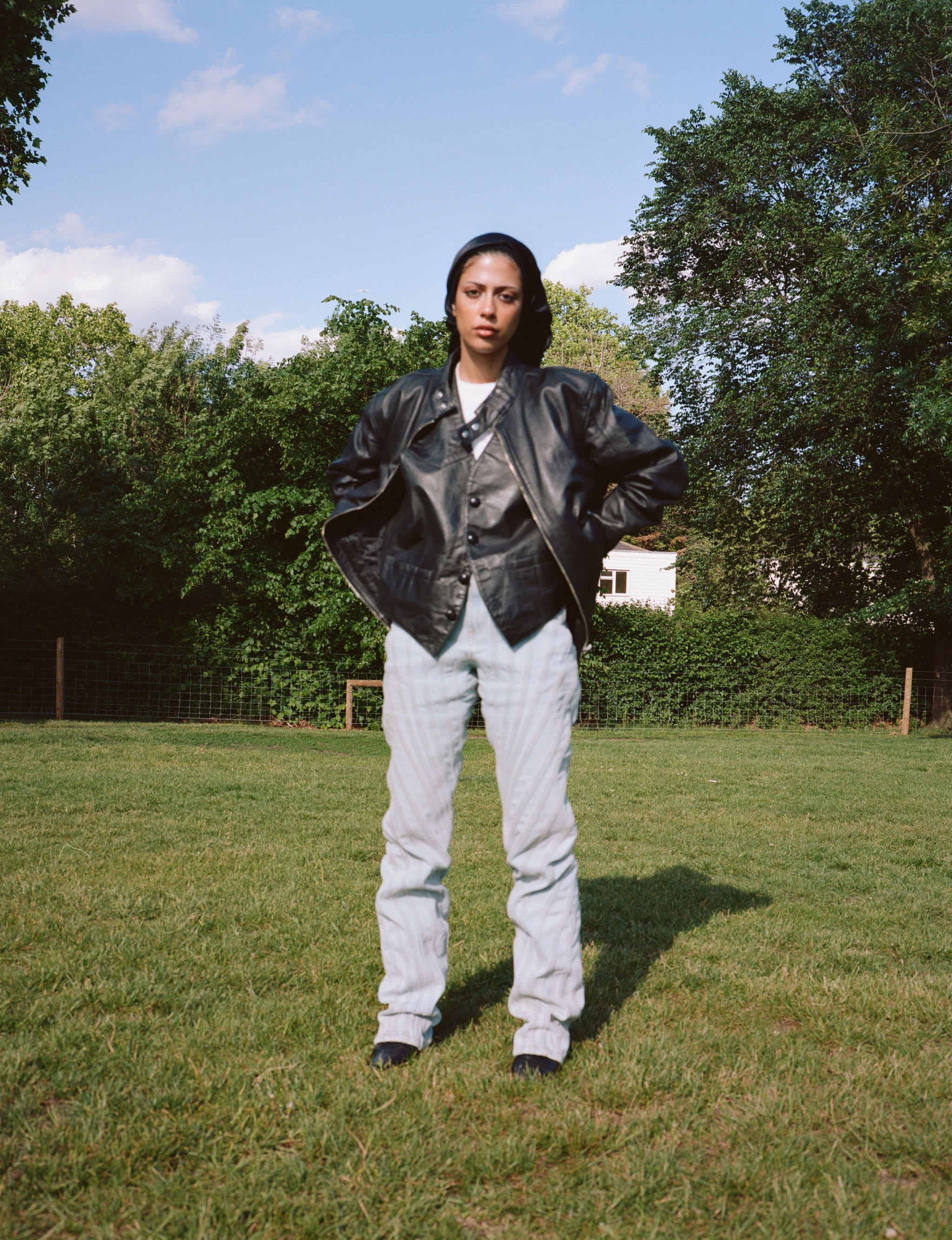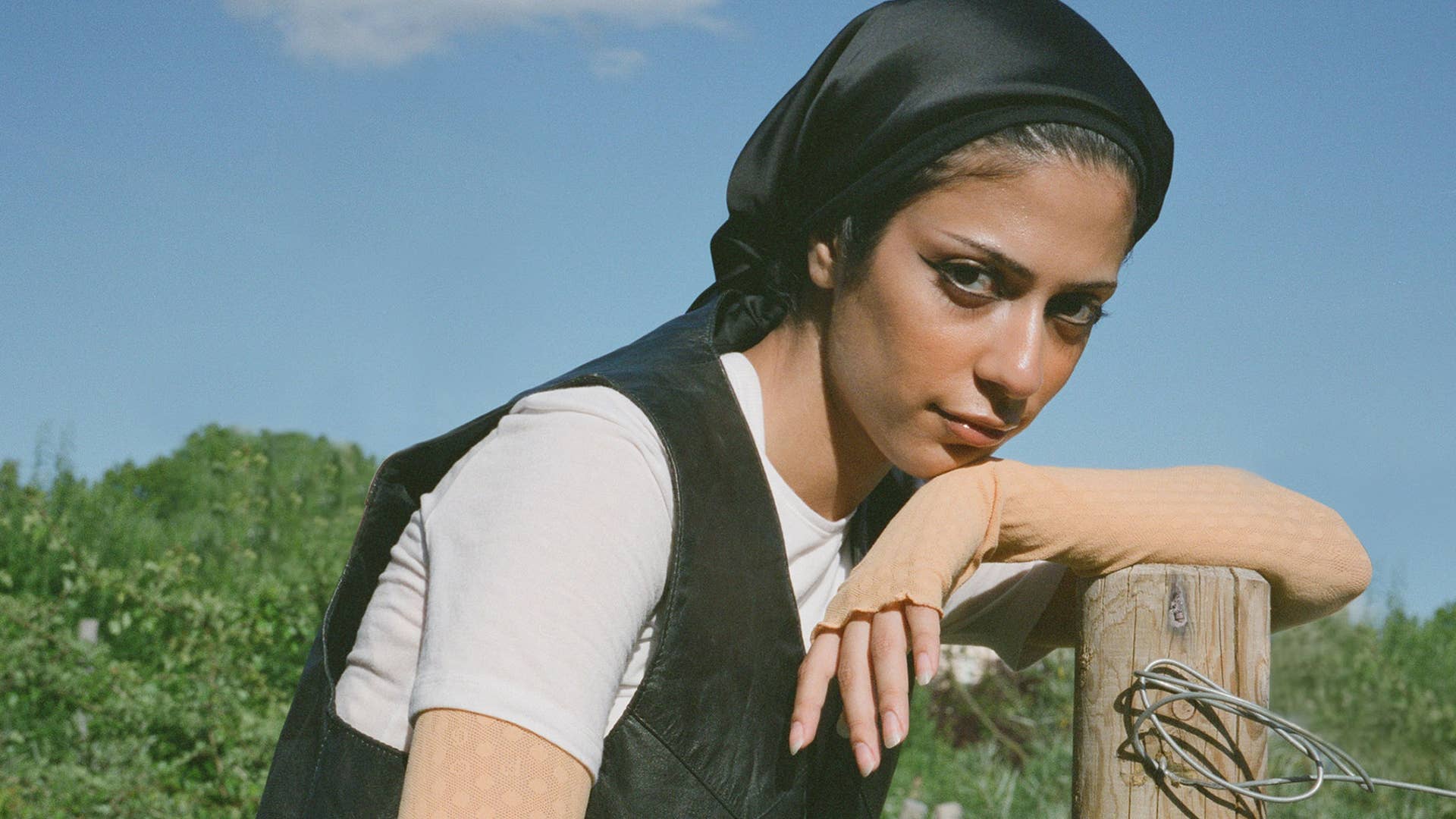
If you’ve ever heard something from Palestinian-Canadian singer-songwriter Nemahsis—a.k.a Nemah Hasan—it’s likely been via TikTok. She’s something of a phenomenon on the app, with over 17 million likes and over 650,000 followers, thanks to videos of her performing her stunning original music and cracking hilarious jokes.
Recently, she’s documenting her travels through Europe, where she’s touring and singing songs from her impassioned EP, eleven achers. The EP dropped in March, and there are songs that touch on womanhood, being an immigrant, and more. It’s the first EP Nemahsis has ever released, and although it hasn’t been out for long, she’s already working on an album.
We caught up with Nemahsis to chat about her journey with her songwriting, her family’s reaction to her success, and making music about her lived experiences.
Obviously, your EP is out, so congratulations on that. I would love for you to share a little bit about the journey to get there and what the process was like recording it and putting it together.
So it was a long process to [get] to a place where I felt emotionally ready to really execute everything. I would say the build-up was a little over a year to actually [figure] out what I wanted to say as a new artist, basically. But then once I had figured it out, a year later it all came together.
So in a matter of months, basically, it came together so quickly that it felt so right. Every vocal take on every song is the demo vocals.
What!
Yeah. So usually I’ll write a song and then because I’ve been writing all day, sometimes [lasting] two days long, or 14 hours or 10 hours, I’ll just lay down a demo thinking I can go home, come back and perform it better. But every time I try to record vocals for every song, it was almost like the emotion wasn’t there because it had channelled out of the writing experience for that song.
“I think with songwriting, being as vulnerable as I am on this project, it’s such a scary territory because I let people see me and all of my insecurities in a way that I’ve never before with anybody, let alone like millions of people that stream [me].”
I feel like I’ve never heard that ever. I talked to so many musicians that I don’t think I’ve ever, ever, heard that. So, I mean, that’s very impressive.
Yeah.
So going into that and the fact that I mean, as you just said, with your emotions being so raw, I feel like that rawness and you being so candid is such a big part of your music because you can look to any number of your songs like “what if i took it off for you?” and “dollar signs”—I’m wondering, do you ever find it challenging to be so vulnerable in your songwriting?
Yeah, I think it might be the worst feeling to date I think, because growing up in an Arab household you’re kind of taught that showing your emotions is kind of weak, and a lot of people can relate to that. So growing up it was like, don’t ever show your tears, don’t ever show that you’re scared, even if there’s a guy rolling behind you, you’re supposed to act oblivious so that they don’t know that they’re anticipating it.
So I think with songwriting, being as vulnerable as I am on this project, it’s such a scary territory because I let people see me and all of my insecurities in a way that I’ve never before with anybody, let alone like millions of people that stream [me]. I think it’s it’s scary to know that I’ve revealed my weaknesses to the world in a way, because now there’s no place for me to be mysterious or take back what I’ve shown to the world, if that makes sense. So that’s just scary. But once you get past that, it is definitely very beautiful. But I’m still going through that. It’s a rollercoaster.
What you just described sounds like some form of catharsis. I also really wanted to talk about “immigrant’s tale” specifically. I personally love that track. It really resonated with me—my mom’s an immigrant who came to Canada, so I just really thought it was so beautiful. I would love for you to chat about that one.
Yeah, that was the last addition to the EP. I wrote that like two months before it came out. I was going to the sessions to write “hold on to me” part two, so I was in album mode at this point. I thought the EP was done. And then on my way there, my sister had left me a voicemail and she was like, “Hey, mom doesn’t want to bug you but I was with her yesterday and she said she misses you. She didn’t want to bug you, she’s waiting for you to call her.” And then before she ends the call she was like, “You know, there’s a little part of her that’s living through you because you’re doing everything she couldn’t do, like, travel and write and do art and meet people.”
My mom’s such an extrovert and I’m not, so I could see how for her, seeing that I’m getting to do what she would have wanted to do [would make] her happy. So then I just started crying on the way to the session and the people that were there [at] that session were under the impression we were doing part two for “hold on to me” for the album. So I get there and I’m crying and I’m like, “We can’t, we have to do this.” And then they’re like, OK—they push everything [so I can] start. I mean, it came together so quickly. I think that was the quickest song that I ever wrote.
[The guitarist in the studio] was just playing guitar, and I was just singing about how that voicemail made me feel. It’s just a story that I’m telling from the perspective of me as a child of my mom, who is an immigrant too, so it just felt so right. It felt so easy and so right to the point that when I showed my manager, she was like, “This has to go on this EP.” And I said, “No, that’s my biggest nightmare. Like, I don’t want anybody to know anything about my mom or me, I just wrote this to please myself.” And he’s like, “Nemah, take it from me; the world needs to hear this.” And I think it’s everyone’s favourite song off the EP. So that was just a [good decision].

I get it because it is very, very raw. But I’m glad that you guys decided to put it on there because I think it’s great. What was your mom’s reaction when she first heard it?
So I told her I wrote a song about her and I give her a little bit of the gist of it. But I actually didn’t let her listen to it until the EP came out. And I was like, “I can’t sit down and watch you cry.” But she ended up calling me crying and she was just like, “Oh, my goodness, it was worth the wait.” And yeah, she had a few questions too. And I answered them for her because obviously English isn’t her first language.
Aw, I’m going to cry now.
I know. I got very uncomfortable because I’m not the type to, like, show my emotions, even to my mom.
If there’s anyone that’s going to be [that person], I feel like your mom needs to be that person.
Definitely.
“I open the topic of discussion in the music world and [among] my listeners and people that don’t necessarily surround themselves with people that look like me. And now they could say they know one Muslim. One hijabi.”
So branching off of that a little bit, actually, you posted on TikTok about your dad and how you sort of had to hide your music for the first 20 years of your life, but that he’s come around now. So tell me a little bit about that.
Honestly, I think him not knowing about my music was obviously… not his fault, but I think that because he told us music was such a sin and he painted it in such a way, I was scared to show him for so long that it’s a big part of me because I was scared to let him down. He’s given up so much. He sacrificed so much so that we could get an education that he never got, and do all of those things that he didn’t get to do because he had to sacrifice so much to feed his family. I think to be like, “Hey you told me not to do this, but I love this,” is a very scary thing to admit because you don’t want to let them down.
And I think one of my biggest regrets was not trusting that he would understand how something that isn’t important to him could be important to me. And I wish I had opened up a bit sooner about it because I think he and I would have had the connection that we have now a lot sooner. Honestly, I think that’s it, because the moment he found out, it was like he knew nothing and then knew everything the next night.
And then it was finally [clear]. He didn’t really understand me as a person—me and him didn’t connect on a lot of things. He… likes to build things, shoot things, [and] be a man. And I was very much introverted. I didn’t like to talk. I was very quiet. And then now, for the first time ever, he was able to see me as Nemah his daughter and all the missing pieces. And so and he was like, ‘Ah-ha, she’s just a creative,’ which he isn’t. He’s the opposite. He does construction. So he blueprints out job [sites] and then works [for weeks on jobs]. I’m creatively chaotic and we’re just polar opposites. But the parts he didn’t know about me are the things that we connect on now. So yeah, he’s super supportive and I don’t think it’s about him coming around, because he didn’t even know about it. I didn’t give him a chance to really know if he needed to come around or not. I think it’s more just that the secrets that I was kind of ashamed of, I finally allowed to come to the surface so that he can embrace the person [I am].
I guess there’s always that fear. And I feel like it’s one of those things, especially when you’re a woman of colour and like especially if your parents are immigrants, you’re like, “I know you have such high expectations of me that I don’t want to disappoint you.”
It eats us alive.
So you’ve mentioned it a few times actually but I didn’t know that you identify as being an introvert. I find this so interesting because I feel like recording, doing songwriting… those are very much introverted activities, but putting yourself out there and performing isn’t. How do you balance that with those internal feelings?
Honestly, performing feels entirely different. I guess I’m very much an introvert, but I’m a performer, so when I’m on stage, I’m like a whole different person. The thing I always say to my manager is, “[In] a room full of people I don’t personally know, it could be a million people, I have no jitters. If it’s a room full of 100 people I know, it’s my nightmare.” Even one person I know, it’s a nightmare. So, I love performing. I’m able to detach myself from my introvertedness. It’s you and the stage and the world is taking that in. There’s no pressure, in a weird way. It’s so weird. I can’t really explain it. But the songwriting process and all of that, even in my sessions, I can’t have more than two other people in a room. I get overwhelmed. So I think I’m very, very introverted, but I’m such a performer at heart that it overpowers my feelings or just any emotions basically.

It’s a fun paradox in a way.
Yeah, yeah. I think it’s a great balance.
As we talked about before, your music is very candid. So it really has connected, at least from what I’ve seen, with women of colour [and] with Muslim women. So how do you feel that your music is contributing to topics around lived experiences that aren’t always talked about that much in music?
I think that’s the best part of what I’ve done so far. I think when I’m feeling really insecure about being at [the] level I am with my music out there, no turning back, I always focus on that. I open the topic of discussion in the music world and [among] my listeners and people that don’t necessarily surround themselves with people that look like me. And now they could say they know one Muslim. One hijabi. I think by having that power [and seeing what] my music has done, that makes it all worthwhile.
And honestly, because that was the whole idea; I started this because when I would talk about discussions I’m having now through my music, but [also] through the words I was saying in the industry before I was creating music—I think people [didn’t] want to listen to that. It’s harder to digest. But when I sing it [with] a melody, it lands easier. People are more empathetic. When something sounds beautiful, it’s like pretty privilege in a way. So it’s like when you’re speaking the words, it hurts. You’re like, this is ugly. I don’t hear it. But then when I combine it with a beautiful melody and poetry, people are like, “Oh my God, yeah, that’s so crazy.” So I think that’s the power that my music has brought [to] someone like me.
To see my music basically do that makes it all worthwhile. So long as I get to see it and start these conversations and empower people, I feel like people that look like me and sound like me will be fine in the long run. I can’t wait ‘til more hijabis start conquering and more brown women start conquering this industry [and do so] better than me. I can’t wait because I think it will make it will make my job easier.
People are always like, “Oh, you’re the first hijabi [to do this].” [But] I don’t want to be that, I want to be like other people [so I can] honestly, write about anything I want. So all the weight isn’t on me, you know?
It’s interesting that you mention that because this is something I’ve noticed more and more[in recent years] is all of these women of colour who, you know, maybe they’re winning an award in something for the first time, these people are saying, “I don’t ever want to be first because that’s too much pressure.” And it’s very interesting because I feel like there was a period of time where people went from feeling you need to be so grateful to be the first one. But it’s also a double-edged sword, because who wants all of that pressure?
So I think the reason why there’s also pressure on that is because as artists, we’re very insecure. And I think I don’t want to be known just because I was the first to do it. I want to be known because I did it well. So I think when you’re the first one to do it, it’s like… I’m putting in all this energy to be the best, but nobody’s even going to notice if I’m the best. I’m just going to always be [seen] as the first, and that’s a label [that’s hard] to have as a Black woman [or] as a hijabi woman, a Palestinian woman or as a trans woman. And it just sucks, because if you look at all the work we put in, we have [more to offer] than a title like that. So I do feel that.
I think it was a while back, I don’t remember which month, but you had mentioned how you wish that people would listen to your original music because so many people know your viral covers that have really just blown up. So do you find that that’s been sort of a challenge with making your way through this industry?
I think, yeah, it was very confusing coming in and it would hurt me a little bit because I was like, maybe my music’s not as good as the covers that went viral. But I’ve come to realize that people just want familiarity. Something like an Adele song that hits millions of people’s ears is, of course, beyond my voice. And in that way it’s like, ‘Oh, they know that song, and my voice is good.’ So when I sing [an] original song, especially with such heavy topics [in] the lyrics that I’m singing, people are trying to escape reality and the way that the world is right now. We’re going through a pandemic, there are literally issues everywhere, like global warming and how it is happening. It’s actually caused a lot of pressure on us. We go on these apps to escape, and then here I am singing about how I feel tokenized in this industry. And people want to support that, but they don’t want to escape the world [by] listening to that all the time. Does that make sense?
So I think I’ve come to realize that my music won’t necessarily blow up as easily on social media as, like, Olivia Rodrigo’s music would. You know, I always say it’s really easy to write about love. Everyone’s experienced love. So to write a song about love, everybody can relate to it. The stuff I’m writing, not everybody can relate to. It’s more so to educate. Either you relate or I’m educating you—at least with the first EP. The album will be different. So yeah, it’s been a struggle, but I’m OK now.



